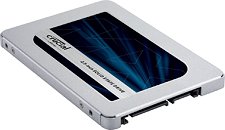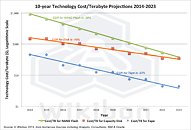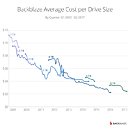Monday, November 26th 2018
SSDs Are Cheaper Than Ever, Hit the Magic 10 Cents Per Gigabyte Threshold
It may be quite difficult to find bargains when it comes to DDR4 system memory or high-end graphics cards these days, but at least SSDs are more affordable now to help bandage that wound. This price drop of solid state storage has been happening throughout this year, and some units have reached a cost of 10 cents per gigabyte, a milestone difficult to have imagined a couple of years ago. The 2 TB variant of the Crucial MX500 SSD, for example, can be found now at $209, and those interested may want to check out our review of the 1 TB version before committing to a purchase.
This is great news already, but there is even better news coming as that cost will reportedly continue to drop. NAND flash could drop to $0.08 per gigabyte in 2019 according to some analysts, and some alternatives such as QLC drives from Samsung could push that trend even further. The traditional HDD market is also getting more inexpensive and better bang-for-your-buck, with a 2017 report from BackBlaze showed for example how cost per gigabyte was approaching $0.02 per gigabyte a year ago on some units. As always, price prediction reports tend to come out with the US market as a case study, but our own global TechPowerUp team is appreciating having more SSDs on deck for files and programs alike.
Source:
Tom's Hardware
This is great news already, but there is even better news coming as that cost will reportedly continue to drop. NAND flash could drop to $0.08 per gigabyte in 2019 according to some analysts, and some alternatives such as QLC drives from Samsung could push that trend even further. The traditional HDD market is also getting more inexpensive and better bang-for-your-buck, with a 2017 report from BackBlaze showed for example how cost per gigabyte was approaching $0.02 per gigabyte a year ago on some units. As always, price prediction reports tend to come out with the US market as a case study, but our own global TechPowerUp team is appreciating having more SSDs on deck for files and programs alike.



70 Comments on SSDs Are Cheaper Than Ever, Hit the Magic 10 Cents Per Gigabyte Threshold
Had 4 of these and 3 out of the 4 died within 6 months with 0 warning after being purchased brandnew.
The old OCZ one I had lasted much longer and I got it used, not new. I do have a quad of Corsair SSD's and so far, so good but I use spinners for the stuff I don't want to lose anyway.
Slower yet more reliable and if one does start to go out at least you have a good chance of getting some kind of warning and possibly saving everything too.
I'll keep my spinners thank you very much.
Two 4TB WD Red 5400RPM drives (what I currently use) in my plex server - cost me around $250.
Two 4TB SSDs right now would cost me around $1500-1600.
The drives I use are for Plex/storage - they work well enough for what I need. I've recorded a crap ton of TV shows (at the wife's request for crummy 80s/90s sitcoms) and I've put on nearly every single DVD/BR I own, on it. The system plays back everything just fine, it takes about 5-10 seconds for a movie to start up (no worse than Netflix or Amazon Prime). I've got nearly 2TB of videos/TV shows on the drives right now so I have lots of room for many more.
If the SSDs were a lot closer in price, around $400 max for two 4TB - that would be much more reasonable and even I'd consider picking two up. Though, I don't think prices will ever be that low for SSD....at least not for a long time.
@neatfeatguy Im right there with you. Many terabytes of media and of data on server. Red HDD are still way more cost effective for me than any SSD with needing over 20TB of storage. One day we’ll get there, but it’s not now and won’t be next year. After? We’ll see.
Unfortunately those manufacturers have yet to figure out that almost nobody cares about solid-state drives that can transfer gigabytes of data per second and do thousands of IOPS, because almost nobody has that sort of workload. Instead, most people want something that has a far lower latency than HDDs, which - guess what - any SSD provides, even the slowest SATA models.
I'm quite certain that if someone released a SATA SSD that could read/write at a mere 150MB/s (SATA1) but had cost/GB of only twice that of a HDD, that product would fly off the shelves like nobody's business. And we are getting there with QLC, despite the FUD that's spread like manure every time QLC is mentioned (see this thread for examples). We've seen this idiocy before when we went from MLC to TLC and guess what, it was all nonsense, and there's zero reason or evidence to believe QLC will be a failure or problematic either.
Samsung's already announced their high-capacity QLC "860 QVO" consumer SSD range which should be available by December... does anyone here really believe that arguably the world's most important player in the consumer SSD space, would announce a product they don't have faith in?
Talking about endurance, a good QLC drive with high capacity & competent firmware+controller will still be good enough for data storage. So when we're talking about high capacity ~ 4TB or upwards, the best HDD in that range, 5 years warranty & enterprise class, will not be price competitive against these products any longer.
now its down to 150 -.-which games require NVMe ssds?
I think I've read there is only like one huge mmo game that would benefit from a nvme ssd
but I wonder if my 80+ GB modded Fallout 4 would load faster too
Again endurance =! reliability & there's more than just anecdotal evidence that modern SSDs are more reliable than HDDs.
Also, I just remembered that almost every SSD I've ever installed has literally just been laying around in the case somewhere, with the exception of a laptop and one desktop that has a 5.25" bay for two 2.5" drives and one 3.5" drive. They don't care. I'll still take a spinner or two for massive data storage if I need it, but other than that, I welcome the cheap, high capacity SSDs... and yes, even the dreaded QLC.
Not only is that offensive to the people who do actually know something about the subject at hand, it also ends up causing other people to pick up on the nonsense and then report it as fact. Then you get those same stupid rumours repeated ad infinitum in comment sections of reviews and forums.
If you choose to be ignorant, all power to you. But be ignorant on your own, because preaching your ignorance doesn't help anyone else, and may very well harm them. (See: vaccines and autism.)
As for the person in question, he/she/it was politely corrected numerous times by other members but simply kept posting the same untruths. The only conclusion is that he/she/it is incapable of responding when addressed politely, hence why I addressed them extremely impolitely. And it appears to have worked, since they haven't posted said untruths in this thread since. If that member is willing to apologise for posting those untruths, I will happily delete my offensive post, as well as publicly apologise to said person.
QLC is not less reliable (how do you define reliable?), it just has fewer p/e cycles than TLC (for reference, SLC also has fewer p/e cycles than HDD). There's no reduction in quality. If anything, the quality of each cell must be better is instead of 8 it now has to hold 16 different voltage levels. It's just physics at work.